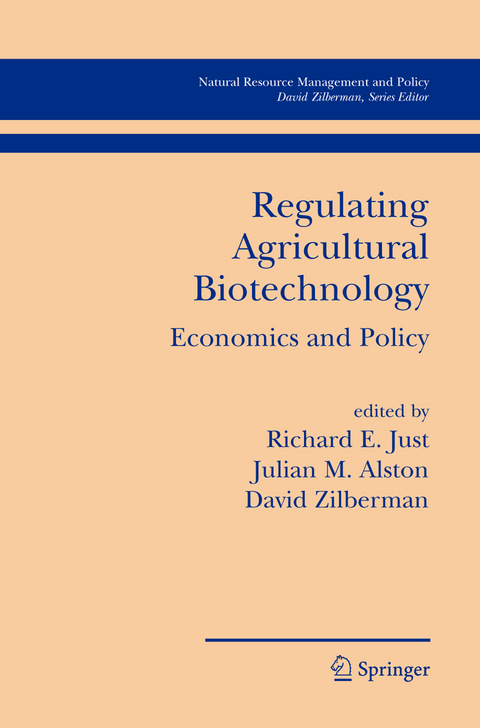
Regulating Agricultural Biotechnology
Springer-Verlag New York Inc.
978-1-4419-4239-5 (ISBN)
REGULATING AGRICULTURAL BIOTECHNOLOGY: ECONOMICS AND POLICY Chapter 1 REGULATING AGRICULTURAL BIOTECHNOLOGY: INTRODUCTION AND OVERVIEW Richard E. Just,* David Zilberman/ and Julian M. Alston * University of Maryland, * University of California, Berkeley, University of California, Davis Abstract: This chapter introduces the topic of this book, drawing upon the content of its chapters. An overview is provided on the economics of technological regulation as applied to agricultural crop biotechnologies. Key elements of agricultural biotechnology regulation in the United States are summarized. Key words: agricultural biotechnologies, causes and consequences of technological regula tion, overview and synthesis 1. INTRODUCTION Agricultural biotechnologies apply modern knowledge in molecular and cell biology to produce new varieties and similar genetic materials. The use of genetically modified (GM) crop varieties has grown dramatically since they were introduced in 1995, and large portions of the land allocated to corn, soybeans, and cotton are grown with these varieties. The evidence from the United States, Canada, China, India, Brazil, and Argentina suggests that these applications of biotechnology in agriculture increase yield, reduce the use of pesticides, and save production costs.
Richard E. Just is Distinguished University Professor and former Chair, Department of Agricultural and Resource Economics, University of Maryland at College Park. Julian M. Alston is Professor, Department of Agricultural and Resource Economics, University of California at Davis. David Zilberman is Chair, Department of Agricultural and Resource Economics, University of California at Berkeley.
Regulating Agricultural Biotechnology: Introduction and Overview.- Agricultural Biotechnology in the Context of a Regulated Agricultural Sector.- Economic Analysis and Regulating Pesticide Biotechnology at the U.S. Environmental Protection Agency.- Compliance Costs for Regulatory Approval of New Biotech Crops.- Regulation of Technology in the Context of U.S. Agricultural Policy.- Managing Liabilities Arising from Agricultural Biotechnology.- Status of Agricultural Biotechnology: An International Perspective.- Interactions Between Trade Policies and GM Food Regulations.- The Value of Non-Pecuniary Characteristics of Crop Biotechnologies: A New Look at the Evidence.- Bt Corn’s Reduction of Mycotoxins: Regulatory Decisions and Public Opinion.- Consumer Attitudes and Market Resistance to Biotech Products.- Comparison of Consumer Responses to Genetically Modified Foods in Asia, North America, and Europe.- Conceptual Issues in Regulating Agricultural Biotechnology.- The Economics of Biotechnology Regulation.- Labeling Regulations and Segregation of First- and Second-Generation GM Products: Innovation Incentives and Welfare Effects.- Regulation of Technology in the Context of Risk Generation.- Environmental Effects of Genetically Modified Crops: Differentiated Risk Assessment and Management.- Irreversibility, Uncertainty, and the Adoption of Transgenic Crops: Experiences from Applications to HT Sugar Beets, HT Corn, and Bt Corn.- Anticompetitive Impacts of Laws that Regulate Commercial Use of Agricultural Biotechnologies in the United States.- Regulation, Trade, and Market Power: Agricultural Chemical Markets and Incentives for Biotechnology.- Regulation and the Structure of Biotechnology Industries.- The Social Welfare Implications of Intellectual Property Protection:Imitation and Going Off Patent.- Case Studies on the Economics of Regulating Agricultural Biotechnology.- International Approval and Labeling Regulations of Genetically Modified Food in Major Trading Countries.- Benefits and Costs of Biosafety Regulation in India and China.- Biosafety Regulation of Genetically Modified Orphan Crops in Developing Countries: A Way Forward.- Bt Resistance Management: The Economics of Refuges.- Managing European Corn Borer Resistance to Bt Corn with Dynamic Refuges.- Farmer Demand for Corn Rootworm Bt Corn: Do Insect Resistance Management Guidelines Really Matter?.- Adverse Selection, Moral Hazard, and Grower Compliance with Bt Corn Refuge.- Damage from Secondary Pests and the Need for Refuge in China.- Regulation of Biotechnology for Field Crops.- Regulation of Transgenic Crops Intended for Pharmaceutical and Industrial Uses.- Regulation of Biotechnology for Forestry Products.- Regulation of Biotechnology for Specialty Crops.- Conclusions.- What Have We Learned, and Where Do We Go from Here?.
| Erscheint lt. Verlag | 11.2.2011 |
|---|---|
| Reihe/Serie | Natural Resource Management and Policy ; 30 |
| Zusatzinfo | VIII, 732 p. |
| Verlagsort | New York, NY |
| Sprache | englisch |
| Maße | 155 x 235 mm |
| Themenwelt | Naturwissenschaften ► Biologie ► Biochemie |
| Technik ► Lebensmitteltechnologie | |
| Technik ► Umwelttechnik / Biotechnologie | |
| Wirtschaft ► Betriebswirtschaft / Management ► Unternehmensführung / Management | |
| Weitere Fachgebiete ► Land- / Forstwirtschaft / Fischerei | |
| ISBN-10 | 1-4419-4239-4 / 1441942394 |
| ISBN-13 | 978-1-4419-4239-5 / 9781441942395 |
| Zustand | Neuware |
| Haben Sie eine Frage zum Produkt? |
aus dem Bereich


